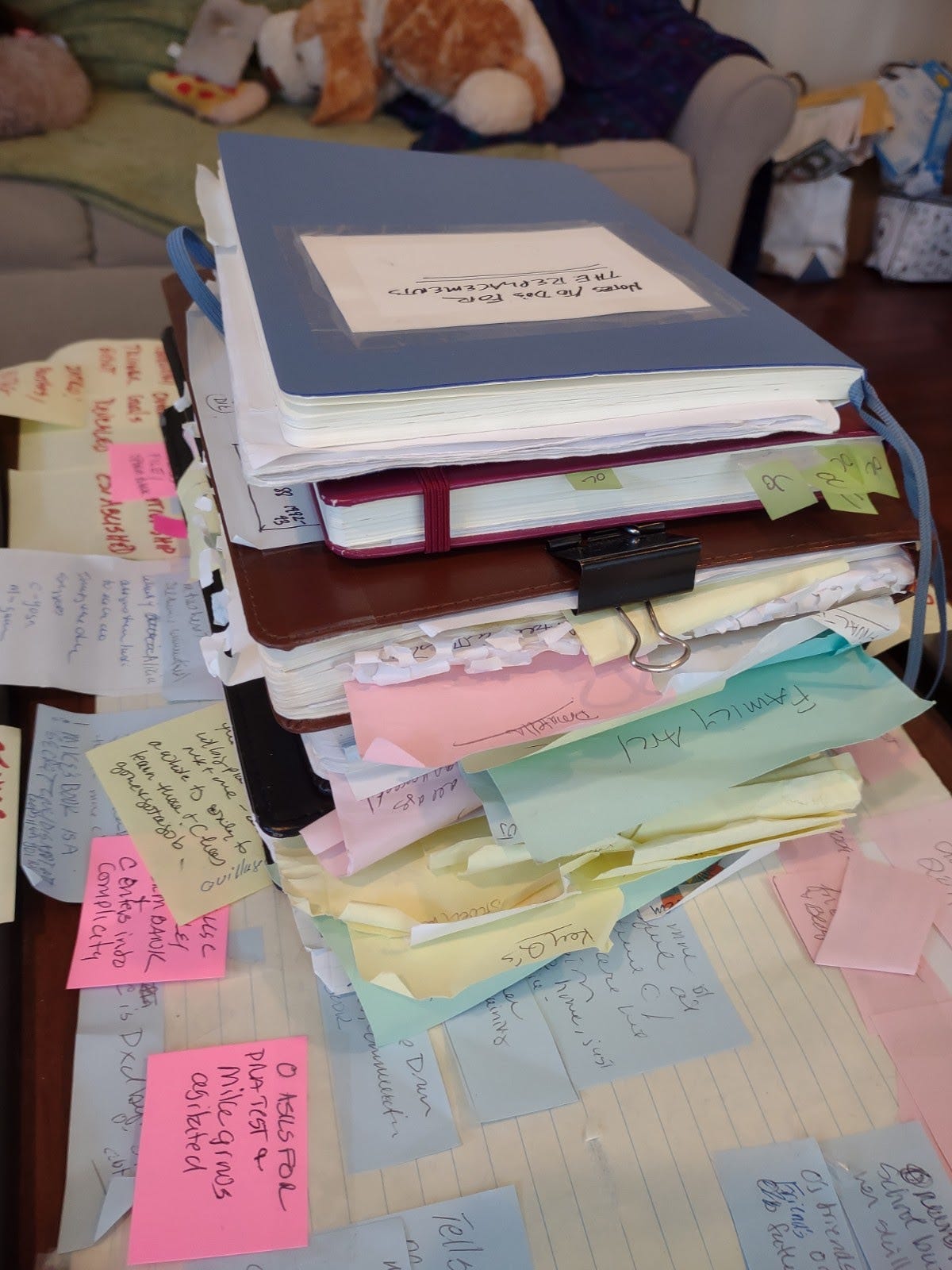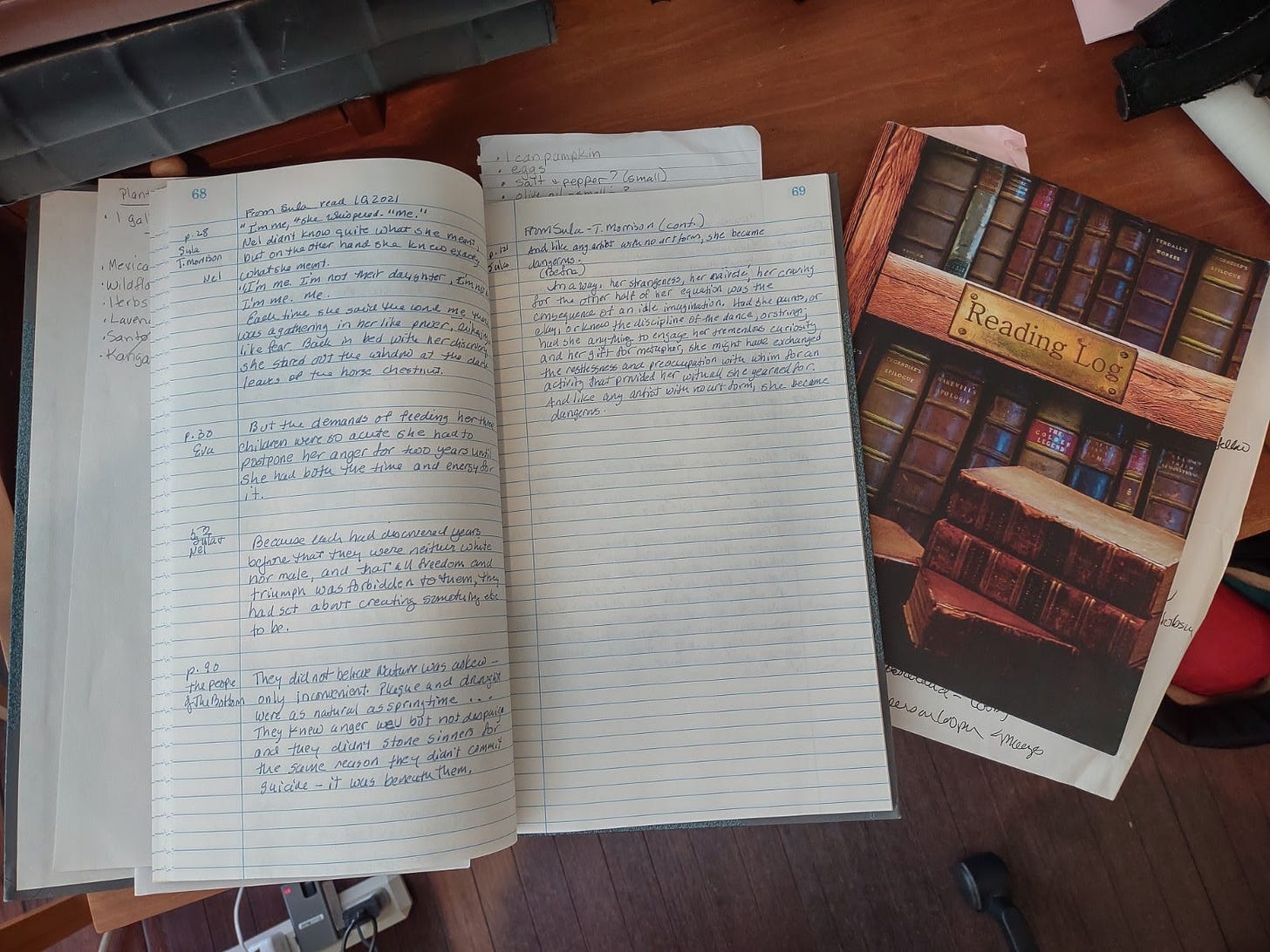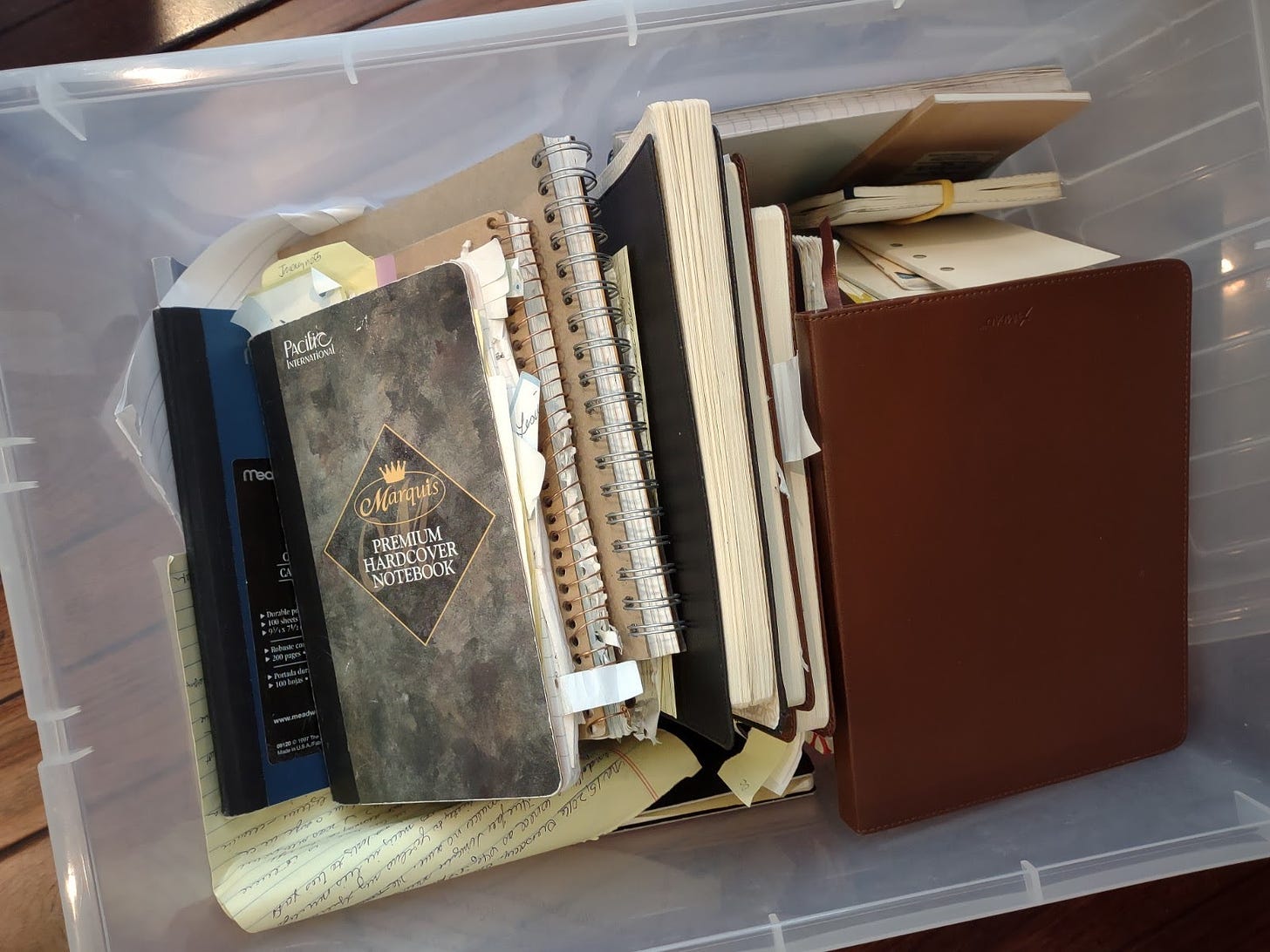Welcome! You’ve reached Spark. Learn more here or just read on. If you received this from a friend, please join us by subscribing. It’s free! All you have to do is press the button below:
In this issue:
What books will you remember from 2021? There’s still time to add to our list
My journal: therapist, record, friend, and foe - also, a total mess
What your loved one really wants this holiday season
Finally, Saeed Jones: “Alive At the End of The World”
I’m going to write this week about journaling. I warn you though, at any minute, I could go dark, really dark. Four o’clock in the morning dark, a time with which I’ve become intimately and reluctantly acquainted.
But first our booklist: “Spark Reads 2021”
Last week I asked you to tell me about the 3 to 5 books that you read in 2021 that you are especially glad you read or that will stay with you. I’m so glad I asked. The list that has emerged in the comments to last week’s newsletter is full of variety, depth, surprises, and great ideas. My email inbox contains even more ideas from you guys. I’m going to put them all together and feature the first ever end-of-year “Spark Reads” list in next week’s newsletter so if you haven’t responded yet, there is plenty of time. Think about the books you’ve read this year. Which ones are the ones that stayed with you, that you would read again, or that you would recommend? And if you haven’t had a chance to check out the ones mentioned last week, just click HERE.
Meanwhile, I have been reviewing the 55 books I’ve finished so far in 2021 and have found a few surprises of my own. I’m going to write about that next week too and explore what these lists of books might tell us about ourselves and the year we’ve had. I’m looking forward, too, to sharing some of the ways people track their reading, so if you are one of those people who keeps lists of books you’ve read, will you please let me know how you do that? Do you scribble out your lists on a pad or a notebook? Do you rely on Goodreads? Are you a spreadsheet person? Is your memory so picture perfect you can summon the image of a book you read along with the dates you began and finished, and what you thought of it?
It’s 4 A.M. and I don’t Know Where My Journal Is
“That's the thing with a diary, though. In order to record your life, you sort of need to live it. Not at your desk, but beyond it. Out in the world where it's so beautiful and complex and painful that sometimes you just need to sit down and write about it.” ―David Sedaris, Theft by Finding: Diaries 1977-2002
For nearly two weeks now, my eyes have opened a few minutes before or a few minutes after 4 A.M. Every time, I refuse to believe that my slumber is over. I get up in the dark, pad to the bathroom and pee in the dark, then feel my way back into the bed in the dark. I close my eyes and try to focus on my breathing and relaxing each muscle one by one in direct opposition to my mind which spins like a roulette wheel on steroids. For two hours every day, I’ve been awake but in stasis - unable to stop turning the wheel even though all I want to do is slip back to sleep and avoid the “beautiful and complex and painful” realities of the world that lies outside my window - as well as the endless loop of “shoulda, woulda, coulda” inside my own head.
I keep telling myself to write it out. Just get up and start scribbling. As I once mentioned in these pages, my journal often doubles as a therapist. I’ve also used it as a folder for checks I need to deposit, to-do lists, a place where I record snatches of dialog or ideas for my current or future novels/projects, quotes from other writers or random people I eavesdropped on while waiting for a plane to arrive or take off, long angry or emotional letters to people who will never see them.
I seem to lack the necessary discipline to find a system and stick to it. David Sedaris, for example, captures his initial notes in a portable diary but transcribes it into an electronic journal he can search and use to write his next book. Then, he published the journal itself, Theft By Finding: Diaries 1977-2002. (I loved it. Every page is a lesson in the art of observation and paying attention.)
Judy Reeves, who teaches workshops on memoir and journaling, traveled solo for an entire year in the 1980s and kept a journal so faithfully that nearly forty years later, she was able to write a memoir rich with detail and meaning. I had the privilege to witness the early development of this book, now on its way to finding a publisher. Writer Nikki Dolson captures most all her story ideas and the drafts themselves in the Notes app on her phone, as she told us when we interviewed her this year.
The first diary I ever owned was a birthday present when I turned eight or nine. It had a key. I was afraid to write in it. Sometimes I didn’t know what to say. Writing “Dear Diary,” as if the book were a person, made me feel even more self-conscious. Each page had a date on it and if I wrote anything, I put it on the correct date so at the end of the year, there were a few entries separated by weeks of blank pages. The last diary I kept in my teenage years was similarly sparse but I made the unfortunate decision to capture the details of my romantic yearnings and sexual awakening. I left it in the top drawer of my bureau and, of course, someone read it. And told her mother. Who told my mother. I am blocking on the ensuing mortification, outrage, humiliation. It’s easy enough to do -- I’ve long since lost that little book. I do know it was years before I kept any kind of journal again.
Now I have accumulated a few decades worth of notebooks, composition books, or fancy journals from years past. They are crammed with notes on napkins or scraps of paper, sometimes bearing a single sentence and no date.
I started an electronic journal in 2006 and use it when I feel like typing instead of scribbling. For a few years, I decided to get organized and use different journals for different purposes: I have 3 large leather-bound and two Leuchtturm1917 journals entirely dedicated to the novel I’m now trying to finish.

I started a completely separate “Commonplace Book” to write down quotes and passages by writers who captured my attention with the way they talked about an idea. Then there was the “Reading Log” book that my husband gave me a few years ago so I could list all the books I read.

These days, I rarely write in the commonplace book even though I mark pages in books I’m reading to put there. My reading log book had enough pages for 100 entries and I can’t keep stapling additional pages into the back. My novel’s notebooks were never with me once I left my desk so I started writing notes and ideas in my personal journal where I then attempted to flag them with color coded stickies so I’d know them from the jumble of other entries that can usually be categorized as “Betsy’s internal musings.” When I cast my eye over these, I am disheartened by the recurrence of certain themes -- writing doubts, regrets, yet one more “plan of action” -- and the focus on my reactions to big life events without much detail on the events themselves. When I read my journals, I get a little sick of myself. I wonder how much I’ve missed along the way.
Link: 10 Famous Writers on Keeping a Journal
The practice makes me realize how much I lose in translation even when I am addressing myself. Key details get lost in the transfer, like fish too small for the net. That could be another reason why I keep reaching for the pen to try again -- in a new system, a new journal, the sheaf of scrap paper I keep by my bed. I want all the fish. I want to get it right. Even if I’m the only one who ever reads it. The longest conversation we have with anyone is the conversation we have with ourselves. My journal is a witness to my ongoing dialog with a person I’m still getting to know.
The Right Journal Is Hard to Find...then of course, there’s the pen
“I used to have a favorite notebook... I have a persistent fantasy that if I could only find this spiral notebook again all my writing woes would disappear.” - Nikki Dolson
This set of links is for those of us who never give up on the search for the right journal.
Even if I feel settled in now with my Leuchtturm1917 with RULED pages, not dotted. I like the numbered pages and the space in the front for the table of contents which I keep meaning to use.
Even though I’m content, I have a wandering eye. I remember the days when I bought whatever was cheapest, or discovered some narrow hardbound composition books at the Dollar Store that satisfied the need for a little heft, line pages, but also made me feel smart about not overspending. Size matters for me. I need a size that is easy to pack but big enough to scrawl, stretch out on the page.
What doesn’t matter to me: decals, designs on the outside, cute sayings on the pages, any attempt to suggest order or where to focus. I like a blank, lined page and a solid cover. I will use stickies to mark pages, but will not usually be drawing pictures or using different color pens. I have a hard enough time find a single pen - gel pens for me, mainly, or ballpoint. Thanks to a good friend, I now own several fountain pens but I keep them safe in a drawer and often forget to use them. I don’t feel worthy of them quite yet.
What kind of journal do you prefer? And what kind of pen or pencil? If you use your laptop, ipad or phone, what app works best for you? Do you prefer to pick out your own journal or do you like to be surprised with a gift?
Link: Which Writers’ Journals Are Worth Reading? (according to the NYT, anyway)
Looking for Last-Minute Gifts?
I’m nothing if not predictable. I say look no further than your nearest bookstore. We’ve all been deluged with ideas and, frankly, most of the gifts we can buy will be fun for a few minutes and then forgotten. Buy a book you love for someone you love. They will thank you. An author will go to bed feeling like her work matters in the world. Your local bookstore will live to see another day.
If you have a writer or a reader who loves George Saunders in your life, consider giving a gift subscription to Saunders’ new newsletter “Story Club With George Saunders.”
Spurred by the response to his wonderful book A Swim in the Pond in the Rain, he launched The Story Club with George Saunders this week. There will be a free version that arrives once a month - so everyone can subscribe. The paid subscribers will get a little more and the chance to interact with Saunders about the short stories.
Finally: Alive At the End of the World
I won’t recap the news for you here. You’ve heard it all. Perhaps, this week’s events have woken you in the dark hours of the morning leaving you to think about the world we are in and how we are to navigate it. I will, instead, share this poem, “Alive At the End of the World,” by Saeed Jones which echoes with more meaning and strength than any of the headlines we’ve read. You can read and listen to it at the same time by clicking HERE.
That’s all for this week. I am looking forward to next week. If you haven’t added your top 3-5 books for 2021, you can easily do that now in the comments or by replying to this email. The more the merrier. If you are looking for gifts, be sure to check out the books in the Spark Community Recommendations Page at bookshop.org where every sale supports local bookstores. Any commission we make, will go towards literacy programs.
Ciao for now.
Gratefully yours,
Betsy
P.S. And now, your moment of Zen...Cattails and Mountains - It’s all in the perspective
This week’s “Moment of Zen” is from Mary Jean N. of Southern California.
“That is Mt. Jacinto in the background. The cattails, small as they are, seem to get in the way of the huge mountain. Which can mean many things.”
Calling for Your Contribution to “Moment of Zen”
What is YOUR moment of Zen? Send me your photos, a video, a drawing, a song, a poem, or anything with a visual that moved you, thrilled you, calmed you. Or just cracked you up. This feature is wide open for your own personal interpretation.
Come on, go through your photos, your memories or just keep your eyes and ears to the ground and then share. Send your photos/links, etc. to me by replying to this email or simply by sending to: elizabethmarro@substack.com. The main guidelines are probably already obvious: don’t hurt anyone -- don’t send anything that violates the privacy of someone you love or even someone you hate, don’t send anything divisive, or aimed at disparaging others. Our Zen moments are to help us connect, to bond, to learn, to wonder, to share -- to escape the world for a little bit and return refreshed.
I can’t wait to see what you send!
(And if you’ve gotten here, liked something, and still haven’t hit the heart below, now’s your chance!









I use Goodreads to keep track of my reading and then I do a list at the end of the year.
I've been keeping lists of the books I've read for more than 10 years now. For the past five or more years, I've added a brief review of each book to my list. Every year I create a Word Docx entitled Books Read xxxx (the year). Every time I finish a book, I add it to the list. I add the books to Goodreads as well.